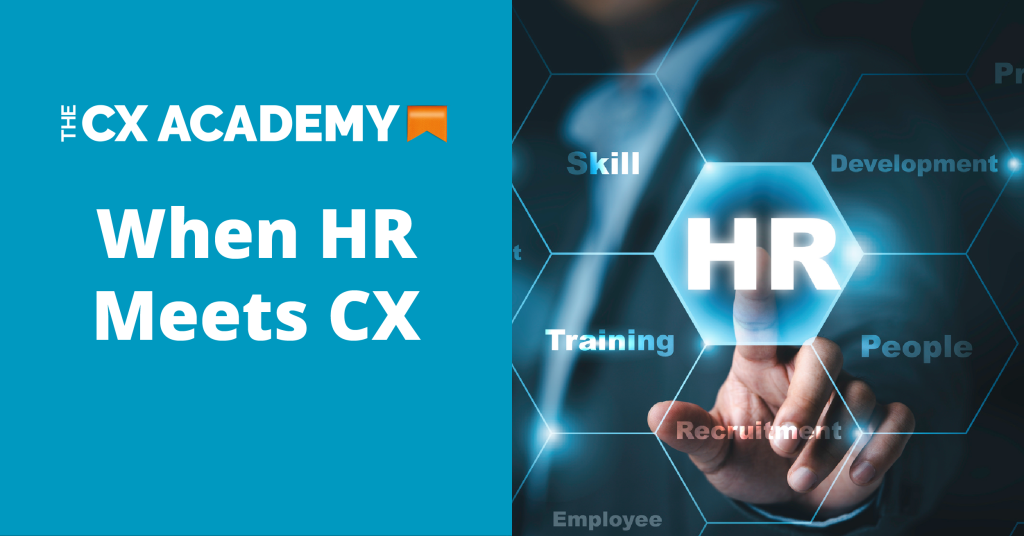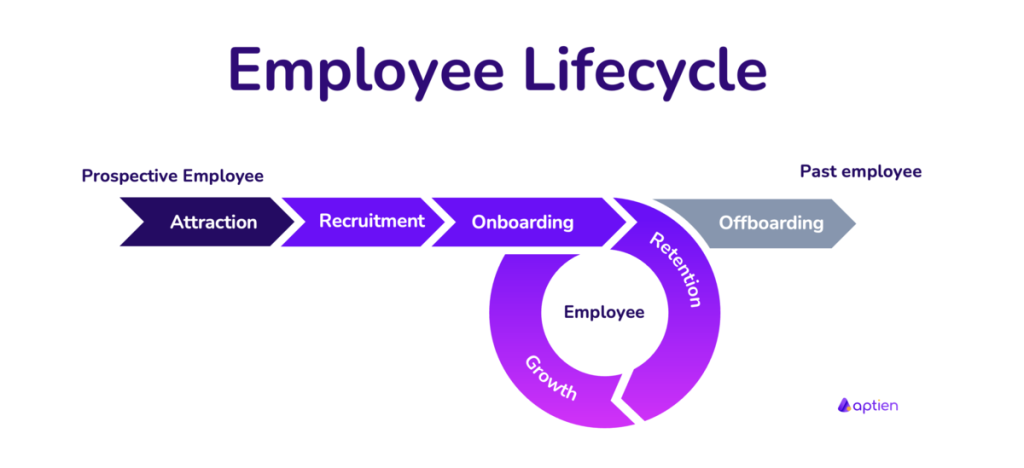
When HR Meets CX
Customer experience is delivered from the bottom up. This means that the customer-facing staff are the ones who will have the greatest impact on CX. However, do not mistake this for full responsibility.
We said it before and we will say it again: Every department in the company has a role in delivering CX Excellence. If just one of these departments don’t work as they should and are not doing their part your whole company will suffer the consequences.
We all know that Employee experience is directly linked to CX and vice-versa, but it all starts with HR.
What does HR have to do with CX?
At first glance, it might seem like HR and CX are entirely separate. However, HR is the foundation upon which great customer experiences are built. Why? Because customer-facing employees are recruited, trained, and supported by HR.

Source: Aptien
At its core, HR is responsible for managing the employee experience – from recruitment and onboarding to training, development, and retention. HR oversees employee policies and benefits and helps to build and maintain company culture. By ensuring that employees have the support they need and are motivated to perform their best, HR grows all recruits into a workforce which directly impacts the quality of experience delivered to all customers.
HR is where the journey begins. This is why recruitment of passionate, empathetic and customer-focused employees is so important. But it doesn’t stop there. HR must also design onboarding and training journeys that nurture these qualities and strengthen the “people-oriented CX muscle”. CX’s success depends on ensuring that staff members are not only skilled but also aligned with the customer-centric view from day one.
As well as that HR must help leadership understand that they are key to fostering a strong CX culture. Leaders need to set the tone by leading with customer-centric values and lead by example, and HR is critical in guiding this process.
How should you recruit CX champions and customer-facing staff?
As mentioned above, the recruitment process of customer-focused, empathetic staff is where your organisation’s journey to Customer Experience Excellence begins. It sounds simple, but many organisations fail from the get-go because they have the wrong goals in mind, when they’re recruiting new employees.
Hiring individuals who can deliver memorable customer experiences is not just about technical abilities or past experience. It is about identifying those who are naturally empathetic and emotionally intelligent. This is because you can easily train and teach technical skills, but teaching empathy is extremely difficult.
During the recruitment process, HR can utilise behavioural interviews to assess candidates’ real-world responses to customer challenges. By asking candidates how they’ve handled difficult customer situations or when they’ve gone above and beyond, HR can identify people who are not only skilled but also have high emotional intelligence and will have the customer at the heart of their decisions. This approach ensures that every new hire is set up to contribute positively to the company’s CX objectives.
To make the hiring process easier, it’s advised that HR specialists are also versed in customer-centric language and the CX basics so that they know what to look for when carrying out the interviews.
At the CX Academy, we specialise in CX training for everyone in the organisation. Doing a short two-hour course will give your HR department the tools, language and knowledge they need to spot great CX talent quickly. If you would like to learn more about how your HR department can benefit from CX training, please get in touch with our Corporate Director Jack, at jack@thecxacademy.org.
Customer-centric Culture
“A customer-centric culture is where an organization focuses its beliefs, values and ideas on creating a great experience for the customer.” To deliver CX Excellence you need to create a deep customer-centric culture in your organisation. HR is one of the most important departments that can help make this happen. Training is one way to develop a unified customer-focused language. But more importantly, HR must ensure that employees are given the authority to make decisions that benefit customers without excessive oversight. This empowerment is a core aspect of building a customer-centric culture.
A company that excels at empowering employees while delivering excellent CX is Southwest Airlines. Steven Belleghem points to Southwest’s success in combining employee well-being and empowerment with customer experience. The airline recognises that treating employees well leads to happier customers and, ultimately, business success. With a 4% voluntary turnover rate, 44 consecutive years of profitability, and 85% of employees reporting pride in their work, Southwest demonstrates that a strong employee experience is directly linked to a strong customer experience. And HR is directly responsible for EX.
However, while HR is a key driver of CX culture, it’s important to recognise that creating a customer-first environment is a shared responsibility. It involves various levels of the organisation, from the board of directors to frontline employees. The board guides the development of the culture, ensuring it aligns with business goals, while the CEO and senior management team define and cultivate the culture through leadership actions. HR, in turn, designs the employee experiences and systems that support this culture, from training to recognition.
Driving force of memorable experiences
From recruiting the right people and empowering employees to always have the customer at the heart of all their actions, HR can help create the foundation for lasting CX success. As Steven Belleghem points out, happy, empowered employees are the key to happy customers—and HR is at the heart of this equation.
At The CX Academy, we understand the crucial role HR plays in achieving customer experience excellence. If you would like to learn more about how CX training can help foster a customer-centric culture contact our Corporate Director Jack, at jack@thecxacademy.org.
